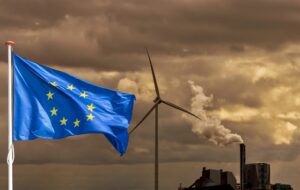The last few months have brought increasing clarity on the legislative framework underpinning the European Green Deal — but very little clarity on the key question of how this will be financed.
The EU estimates a need for an additional €477bn per year to 2030, in the energy and transport sectors alone, for a Fit for 55-aligned scenario.
The energy aspects of REPowerEU and NZIA are estimated as an additional €43bn per year, bringing the total to €520bn.
While a large share of this will necessarily be covered by private investments, public funds need to play a significant role to the tune of 20-30 percent of the total in order to unlock private investments for a total additional requirement of around €130bn per year for the energy and transport sectors alone.
In order to achieve the targets set in the European Green Deal, public finance intervention is essential.
National resources alone cannot provide the answer, as the limits imposed by the proposed revision of the Stability and Growth Pact would prevent countries with higher debt/GDP ratios from taking on debt to the levels required by the transition.
Existing funds can be a part of the answer, but investment needs are too great to be met with what money is already on the table. The Strategic Technologies for Europe Platform (STEP), for example, leverages existing programmes and only provides a total of €10bn of additional money — this is unlikely to be sufficient for the ambitious industrial transformation and creation of value chains that Europe needs.
And it is crucial that the financing of the transition doesn’t come at the cost of redirecting funds meant for other important priorities, such as territorial and social cohesion.
There is therefore a contradiction between the climate goals and economic opportunities of the European Green Deal on the one hand and the macroeconomic constraints and lack of central funding that make this unaffordable to many member sates.
Price of failure
And yet a failed transition would have a negative impact on the economic development of these countries and on the sustainability of their debt — the exact opposite of what the Stability and Growth Pact rules intend to achieve.
Successfully decarbonising the economy and reaching the climate goals of the European Green Deal is fundamental for each country individually and the EU collectively in order to preserve the prosperity of Europe.
The climate transition presents us with a unique opportunity for economic prosperity and jobs, as the IEA estimates that the green technology market will be worth around $650bn [€615bn] per year by 2030.
In order to earn a share of this future market, it is imperative to invest now in the value chains of green technologies and goods. The decarbonisation of our economies is an industrial challenge driven by public policies, and the stakes are high due to competition intrinsic in other countries’ initiatives, such as China and the USA.
European private investors need long-term certainty on the legislative as well as the public financing side before they mobilise the resources our industry needs to transform. The question on the financing of the transition must therefore find an answer as part of the current debate on the reform of the Stability Pact and wider macroeconomic framework, without further delay or uncertainties.
Next Generation EU showed a novel way to find the resources that Europe needs to face the most pressing crises and priorities, that could be replicated. A central fiscal capacity dedicated to climate action and financed through common debt would enable all member states to access the required funds while guaranteeing harmonised controls and a shared system of strong conditionalities, therefore ensuring better quality of spending.
The option of a European Climate Fund should be put on the table by the Commission, so that it can be considered as part of the wider macroeconomic debate. The climate change think tank ECCO, alongside politicians, economists, industry associations, trade unions and other stakeholders has signed a letter urging the president of the Commission to do just this.
The time to provide certainty on how the transition will be financed is now, as this will be crucial for the future of our economies and the prosperity of all Europe.
Read the letter here
Photo by Greg Rosenke







